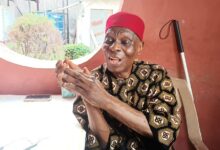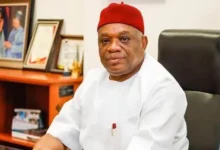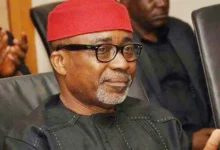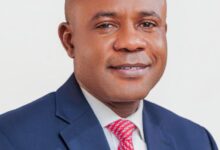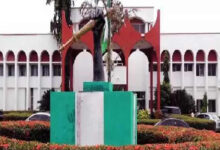
On Thursday, February 16, 2017, the sun set on the career of Damian Azubuike Nwankwo Okoye, a prodigy of traditional music born in Arondizuogu. Known by many as “Ichie Mezuo” or “Alusi Makaja,” he is also more popularly known as “Pericomo” among the masquerade-loving Igbo people of South East Nigeria, both at home and abroad.

Pericomo
A tangible sense of sorrow and grief spread along with the news that the well-known minstrel had joined his forefathers, which first surfaced on the internet. The man was so well-liked that even those who had only heard his music and did not know him were devastated to hear of his passing.
Pericomo was the Don, the “father father,” the unchallenged champion, the “Cultural Prime Minister,” and a very well-liked master of traditional music in Igbo country throughout his lifetime. In his home Arondizuogu, where Pericomo’s music is more like to a national hymn, the pounding beat of his multi-gong philosophical melodies mixed with the seductive sound of the flute operated like a potent concoction that spurred young men to frenzied acrobatic displays.
A living legend and enigma, Pericomo was the subject of several stories and supernatural deeds. From generation to generation, people will tell the tale of his run-in with tax collectors in Onitsha’s Upper Iweka neighborhood, which was documented in the music video for the song “Pericomo na anyi ajo aru.”
It was difficult to distinguish reality from fiction with Pericoma. This renowned celebrity was credited with so much that different individuals would experience various things just by hearing his name. Often, all that was needed to expedite a debtor’s redemption was for a creditor to allege a connection to Pericoma or to threaten to report a debtor to him. Since he was thought to be the “Lion of Africa” and had legendary abilities, both real and imagined, no one dared to challenge him.
After taking the traditional music world by storm in 1976, Pericomo ruled the stage and set the pace for four decades, releasing hit songs every year, until his voice started to falter in 2015. Two years later, the rich voice that for forty years had filled the air with the sound of different gongs and the piercing sound of a flute, enchanting both young and old with tales of unending proverbs and miraculous deeds, has vanished. Although many perceived Pericomo’s music and demeanor as leaning towards fetishism, his accomplishments are numerous, and there is no denying the relevance of his message of cultural rebirth.
The credit for turning Arondizuogu into a household name in Nigeria—to the point that the two have almost become synonymous—belongs to Pericomo. The credit for bringing attention to the Ikeji Festival of Arondizuogu and for transforming traditional masquerade music from Igbo into the well recognized musical genre it is today goes to Pericomo. This wonderful musician has accomplished so much that even people who are not familiar with the Igbo language or the ageless Igbo philosophy ingrained in his lively lyrics may still appreciate his music. Igbo traditional masquerade music was synthesized by Pericomo and became a symbol.
CHILDHOOD AND BIRTH
In Okigwe LGA, Imo State, Pericomo Okoye was born in 1948 into the family of Mazi Nwankwo Okoye Emesuo (Ejezuo) of Ndiogbuonyeoma Ndebeuche, Arondizuogu. This talented traditional music master travelled far and wide in pursuit of his destiny since he was unable to identify his natural calling in a timely manner. He traveled from Ndiogbuoyeoma Ndebeuche, his native town, to far-off locations. One of his songs, Ejezuo, tells the tale of his journey.
MUSIC VENTURE
The sojourner discovered his purpose in 1976. He joined the “Njima” (Arondizuogu Traditional Masquerade Group) and quickly rose to prominence. In 1976, the group recorded a 4-track album named “EJEZUO” under the Janco Records label. Mazi I.E. Kanu, well-known from Ikan Power, led Njima, which had prominent members such as Mazi Ignatius Ohia (Ogidigba), Mazi Egbo Umeibe (Tempest), and Almos Omeokachie. It was Omeokachie who brought the young Pericomo into the group, where he took on the role of lead vocalist. Another day will have to tell the narrative of how Pericomo’s singing ability made him an overnight star in Njima and made some of his fellow countrymen envious of him.
That same year, Pericomo broke away from Njima due to internal strife and went solo under the moniker “Pericomo Okoye and his Traditional Music Group, Arondizuogu.” Under the Jicco Records label, he instantly issued a six-track LP called EKERE-MGBA. His star started to come out. Since then, this phenomenon in traditional music has put out a number of chart-topping singles that have turned egwu nmonwu into a prominent genre in Nigeria and made him an Igbo traditional music icon. Pericomo is indeed deserving of the esteemed title of “Cultural Prime Minister” of Igboland. For four decades, Igbo traditional music aficionados eagerly anticipated the yearly publication of his musical works.
ACTIVITY IN CULTURE
Beginning in 1976, Pericomo waged a ceaseless war (using music as his weapon) to advance the Ikeji Festival and make sure that the greatest of Igbo cultural legacy was not threatened by ferocious westernization and Eurocentrism. With his song, Pericomo offered a stronghold and a powerful defense for the fervent upholding of Igbo customs as well as successful cultural lobbying against the ravages of extreme Pentecostalism and religious fanaticism. He effectively started what is akin to a cultural evangelism that is still going strong today.
THE SONG
Pericomo consistently published a volley of melodic songs every year from 1976 to 2016, culminating in a massive assault of Igbo traditional music. There isn’t another Igbo traditional music performer who has been as prolific and reliable. Following the release of Ekeremgba Pericomo’s well-known Isi na Udo Ga Adi? Isi na udo gadi Vol. 2 (1980) and Ejezuo Vol. 2 (1981) came straight after this. With Oderigwugwu by Title (1986), Irigorogwo (1987), Uto Nti (1988), and Anulika – Oforndu Special (1989), he unleashed an unending barrage on the airwaves as his music continued to transcend cultural borders and pique the interest of all Igbo groups. High Tension (1998), Ogba Aghara (1990), Aja Egbu Edi (1991), and Ogbalu Uwa Ghali (1992), among others. He put out a further 16 albums between 2000 and 2015, among them Onye Napuru Ibe Ya (2010), Igbudu Ogwe (2014), and Ihe Ebuka (2015). A thorough analysis of Pericomo’s albums and songs would demonstrate his inventiveness and creativity.
Nobody remains motionless when Pericomo performs and summons one of his skilled flute players, such as Nwankwo Ija, Okoli Agaghaga, Lawrence Nwaiheanaeboagu, Muoneke nwa Ibeakanma, Omenka nwa Osina, or Akwarawhonge, to enhance the rich blend of traditional musical elements with the scorching sound of the flute. To put it gently, the beat is enthralling. That is where Pericomo’s magic is found. In addition to his music, Pericomo starred in a number of videos that were either themed around his music or his passion for Igbo mythology and history.
Acknowledgment
Pericomo was bestowed with several honors. He also got certain honors, which he accepted with reluctance. During my tenure as President-General, on December 27, 2008, the Arondizuogu community, in collaboration with the Arondizuogu Patriotic Union (APU), presented Pericomo as an ICON OF CULTURE during the community’s inaugural Arondizuogu Day celebration. As a Special Guest at the event, Prof. Maurice Iwu, the then-Chairman of the Independent National Electoral Commission (INEC), gave the award plaque to the musical icon. It was an excellent merited respect to a guy who had made a name for himself and who, by his music, had elevated Arondizuogu ancestry to a level never before seen in the public sphere, both positively and negatively. negatively, since his repeated allusions to Igbo herbalists and oracles sought to paint Arondizuogu as a homey village full of idols and shrines, which is untrue.
FINAL VERDICT
Pericomo contributed more to sustaining Igbo heritage and culture than any other artist of Igbo descent. His unwavering commitment to his art, the strength of his convictions, and the constancy of his songs allowed him to fly the flag of Igbo Heritage. Defiantly pushing back the boundaries of ignorance and stigmatization, which have been the bane of Igbo culture and heritage, this unstoppable musical idol and traditionalist not only stopped the onslaught of cultural iconoclasts lining up against Igbo language, culture, and tradition for 40 years.
For forty years, this talented singer delighted fans of traditional masquerade music in Igboland, throughout Nigeria, and in the diaspora with an unending mix of melodious songs adorned with an extensive collection of proverbs, idioms, and tales typical of the Arondizuogu people, his ancestral home, and the Igbo ethnic group of South East Nigeria, where proverbs are, according to Chinua Achebe, “the oil with which words are eaten.” This gifted musician has put out forty incredible albums in those forty years, which are a living testament to his skill. However, everything that begins must come to an end.
Pericomo may be dead, but his strong legacy of Igbo cultural activism and philosophy will undoubtedly outlast him, and his music will continue to make his voice even more heard for many years to come. The sun is about to rise for Arondizuogu, whose cultural hegemony and growing reputation as the citadel of culture and tourism that Pericomo laid for forty years with his irresistible voice and unmatched music, as well as for his home state of Imo State, which is without a doubt the center of culture, tourism, and hospitality.
*From Owerri, Imo State, Mazi Uche Ohia sent in a letter.
February in the year 2017





